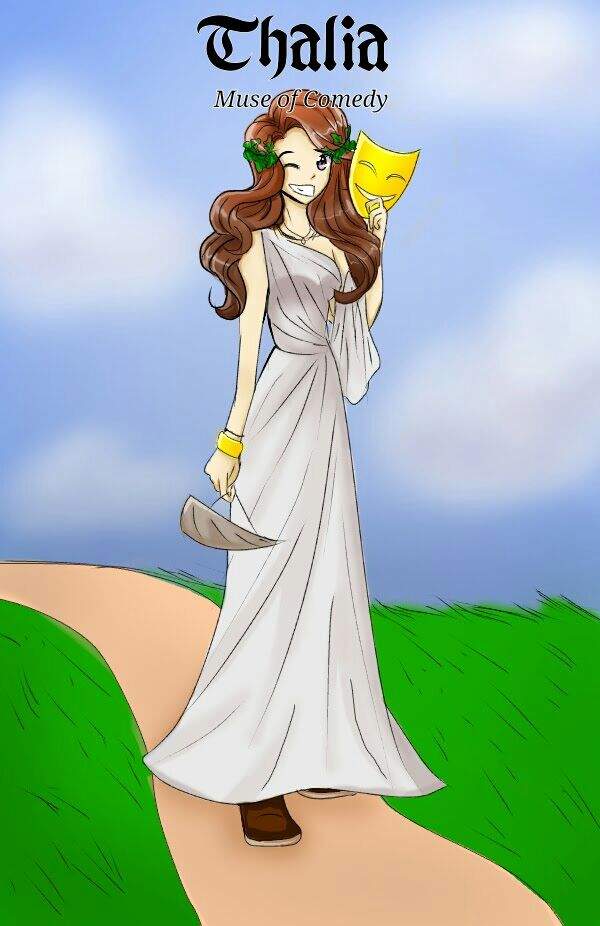


Source: Dictionary of Greek and Roman Biography and Mythology. 77.) She became the mother of the Corybantes by Apollo. and, at least in later times, regarded as the Muse of Comedy. THE KORYBANTES (by Apollon) (Apollodorus 1.18) ZEUS & MNEMOSYNE (Hesiod Theogony 75, Apollodorus 1.13, Diodorus Siculus 4.7.1, Orphic Hymn 76) OFFSPRING Her name was derived from the Greek word thaleia meaning "rich festivity" or "blooming." In this guise she was portrayed with the attributes of comic mask, shepherd's staff and wreath of ivy. In the Classical era, when the Mousai were assigned specific artistic and literary spheres, Thaleia was named Muse of comedy and bucolic poetry. THALEIA (Thalia) was one of the nine Mousai (Muses), the goddesses of music, song and dance. Warburg Institute Iconographic Database (c.Festivity, Blooming Muse Thalia, Greco-Roman marble statue C2nd A.D., State Hermitage Museum.Wikimedia Commons has media related to Clio. Greek text available from the same website. Online version at the Perseus Digital Library. in 2 Volumes, Cambridge, MA, Harvard University Press London, William Heinemann Ltd.

Pseudo-Apollodorus, The Library with an English Translation by Sir James George Frazer, F.B.A., F.R.S.Greek text available at the Perseus Digital Library. Online version at the Perseus Digital Library Cambridge, MA, Harvard University Press London, William Heinemann Ltd. Pausanias, Description of Greece with an English Translation by W.H.S.^ Carder, Sheri: "Clio Awards" The Guide to United States popular culture, pages 180–181, ISBN 978-0-87972-821-2.^ Pausanias, Graeciae Descriptio 3.1.3 & 3.19.4.^ Pseudo-Apollodorus, Bibliotheca 3.10.3.^ Lewis and Short, A Latin Dictionary: Founded on Andrews' Edition of Freund's Latin Dictionary: Revised, Enlarged, and in Great Part Rewritten by Charlton T.Liddell, Henry George Scott, Robert A Greek–English Lexicon at the Perseus Project Clio and the Poets: Augustan Poetry and the Traditions of Ancient Historiography. The Oxford Companion to Classical Literature (Revised 1984 ed.). 'Clio' also represents history in some coined words in academic usage: cliometrics, cliodynamics.Ĭlio Bay in Antarctica is named after the muse. Likewise, the undergraduate student outreach group for the Penn Museum at the University of Pennsylvania is known as the Clio Society and Geneseo College’s oldest society is ‘Clio’. The Cambridge University History Society is informally referred to as Clio, similarly, the Cleo of Alpha Chi society at Trinity College, Connecticut is named after the muse. In her capacity as "the proclaimer, glorifier and celebrator of history, great deeds and accomplishments," Ĭlio is used in the name of various modern brands, including the Clio Awards for excellence in advertising. Other accounts credit her as the mother of Linus, a poet who was buried at Argos, although Linus has a number of differing parents depending upon the account, including several accounts in which he is the son of Clio's sisters Urania or Calliope. According to Apollodorus, Clio was made to fall in love with Pierus by Aphrodite, for Clio had derided her for her love affair with Adonis. Some sources say she is also the mother of Hymenaios. She had one son, Hyacinth, with one of several kings, in various myths-with Pierus or with king Oebalus of Sparta, or with king Amyclas, progenitor of the people of Amyclae, dwellers about Sparta. Other common locations for the Muses are Pieria in Thessaly, near to Mount Olympus. Along with her sister Muses, she is considered to dwell at either Mount Helicon or Mount Parnassos. Like all the muses, Clio is a daughter of Zeus and the Titaness Mnemosyne, goddess of memory. The name's traditional Latinisation is Clio, but some modern systems such as the American Library Association-Library of Congress system use K to represent the original Greek kappa, and ei to represent the diphthong ει ( epsilon iota), thus Kleio.Ĭlio, sometimes referred to as "the Proclaimer", is often represented with an open parchment scroll, a book, or a set of tablets. Clio's name is etymologically derived from the Greek root κλέω/κλείω (meaning "to recount", "to make famous" or "to celebrate").


 0 kommentar(er)
0 kommentar(er)
